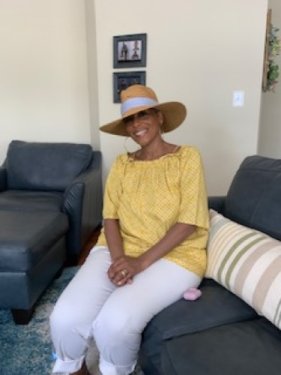Tonia S. – Diagnosed at age 40

Since the age of 9 when I was being treated by a renal doctor, the question of lupus has been raised. I was not officially diagnosed with lupus until I was 40 years old. As a teen, the first symptoms I noticed were joint pain in my knees. At 14, I was walking with a friend down the hallway at school, and my knees buckled, then gave out and I ended up on the floor. Out of nowhere, I found myself on the floor. From that time, the joint pain worsened, making it hard to even sit for long periods of time. I couldn’t squat without feeling intense pain and always required assistance to return to standing. In 2004, I sought help after the joint pain became severe and I was experiencing dry eye and mouth. At that time, I was diagnosed with Sjogren's Syndrome. I was treated with hydroxychloroquine as a part of a clinical trial. In 2008, I started to see a rheumatologist who was treating me for Sjogren's. In 2011, I was finally diagnosed with lupus.
My lupus was well-managed for years. But my lupus spiraled out of control when I experienced a major life event in 2017, which triggered a severe flare. I started to notice thinning of my hair and then skin changes. My scalp started to burn incessantly as if it was on fire and eventually my hair fell out. I developed discoid, then cutaneous lupus and was treated by a dermatologist. I was embarrassed: I hid my baldness and covered up with makeup. I didn't share my diagnosis with anyone outside of my immediate family. I had to process and then accept my disease. When I finally had to wear wigs or scarves regularly, my diagnosis hit me hard. I cried every time I looked in the mirror or even thought of it. My once flawless skin perished with scarring and harsh pigmentation. I was devastated!
I had to learn what "balance" was to control stress, which was a major factor in my daily life. My rheumie constantly stressed balance and treated me based on my lifestyle. My lupus is currently being treated with hydroxychloroquine and a monthly Benlysta infusion. Even though I have pain regularly, I am thankful it isn't daily. I know my triggers and am able to manage my lupus well.



